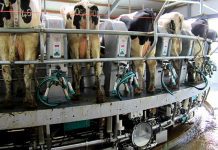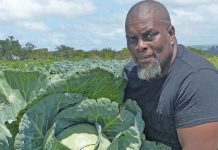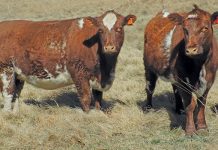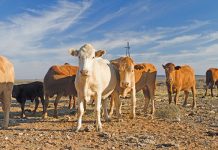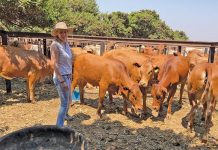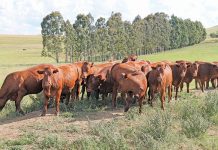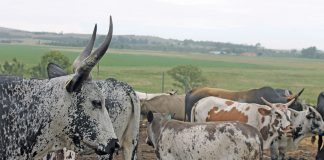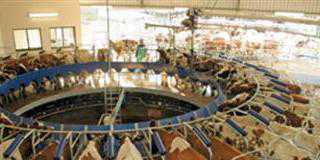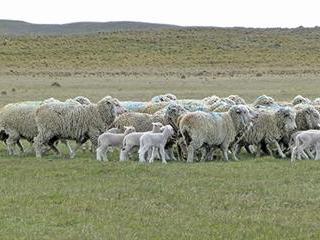
The dual-purpose Dohne Merino breed has been developed in South Africa over the past 50 years using the most modern breeding methods, through interbreeding Australian Peppin Merino ewes and German Mutton Merino sires. Hundreds of breeders throughout the country have taken part in the process. Dohne Merinos have been shown to significantly improve the productivity of sheep flocks.
Hugo Vera of Estancia Josefina near Punta Arenas in Patagonia, introduced Dohne Merino sheep to Chile in 2004. The aim
was to reduce the fibre diameter in Corriedale flocks – the main sheep breed in Chile – and to increase the value of the wool clip, while maintaining or improving lamb and meat production. On a recent visit to Chile, it was clearly evident how successful the initiative was proving to be, with a significant reduction in fibre diameter already being realised.
One of the farms visited was Juan Gysling’s Estancia Santa Barbara in Tierra del Fuego. Juan started breeding sheep on the 11 000ha family estate in 1997. The higher altitude portion of the land has an average annual rainfall of 300mm to 350mm and is grazed in summer. In winter, sheep are moved to grazing at sea level, where the average annual rainfall is 280mm to 310mm/year.
It rains mostly in winter and snowfalls are frequent. The low temperature means that evaporation is minimal. The vegetation on low, rolling hills interspersed with flat depressions, consists of mixed tussock grassland with palatable grass among the tussocks and scattered shrubs. About 400ha has been developed as managed pasture.
At the average stocking rate of 0,78 sheep/ha, the estate carries 7 000 sheep. These consist of 5 000 breeding ewes, 1 200 young replacement ewes, 300 hogget rams for replacement and for sale, 150 mature rams, and a small number of sheep for domestic consumption.
Coarse wool – Low prices
Traditionally, the farm carried Corriedale sheep, with income derived from wool and slaughter lambs. Corriedales have long, coarse wool averaging nearly 24µ for hogget wool and more than 28µ for mature ewe wool. Because of the low price realised for this type of wool, Chile’s department of agriculture encouraged the use of Dohne Merino genetics to reduce the fibre diameter of the wool clip and increase its value.
Cautious by nature, Juan decided on Dohne Merinos only after a comparison trial with the Multi-Purpose Merino. In 2010, he started inseminating all his ewes with semen from pure Dohne Merino rams and F3 (7/8) Dohne Merino rams bought from the Josefina Dohne Merino stud.
“We culled only sheep with severe defects such as faulty jaws, black spots, fleece with hair, or very dense fleece, and defects of conformation, especially size,” he explains. “With Dohne Merino genetics, we’ve already reduced the fibre diameter to 21,5µ in the two-tooth progeny and to 24,5µ in ewes up to five years old.”
According to Juan, the price for hogget wool has increased by 65% and by 60% for wool of adult sheep, while the dual-purpose characteristics of the Corriedale have been improved on in the Dohne progeny in terms of reproduction and growth rate. Corriedales have a number of other inherent problems with their wool that are incompatible with fine Merino apparel wool. These include pigmented fibre, medullated fibre (kemp) and harsh wool. All these will receive attention in the future.
“Starting this year, freedom from pigmentation and soft faces will be added to the selection criteria,” says Juan. “I anticipate that, within five years, most adult sheep will have fleece averaging 21µ to 22µ and the hogget ewes’ fleece will average 20µ.”
Pure Merinos
In 2010, Juan initiated a programme to breed pure Dohne Merinos with embryos from the Josefina Dohne Merino stud and the Mount Alma and Macquarie Dohne Merino studs in Australia. The first lambs, of which 12 were selected, were 12 ewe lambs and 15 ram lambs. In May last year, the progeny of two of the best young rams, a total of 72 embryos, were flushed from the young ewes.
“This year, I want to add another genetic line, probably imported from Australia or the Tres Arboles Dohne Merino stud in Uruguay,” says Juan.
Email Cameron McMaster at [email protected].

